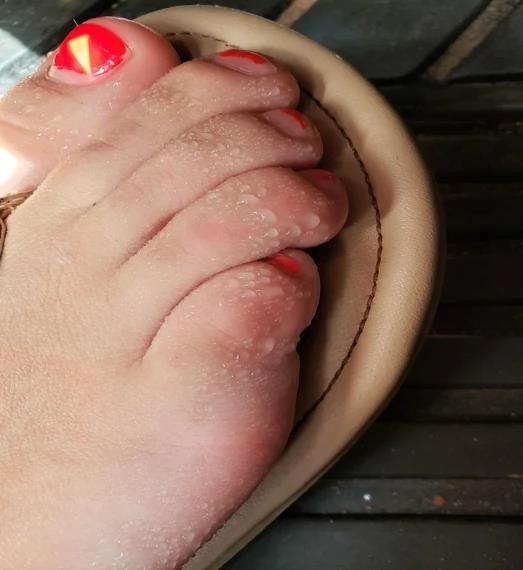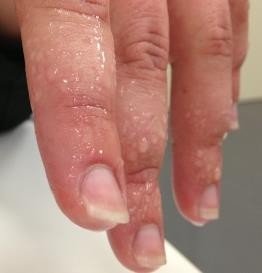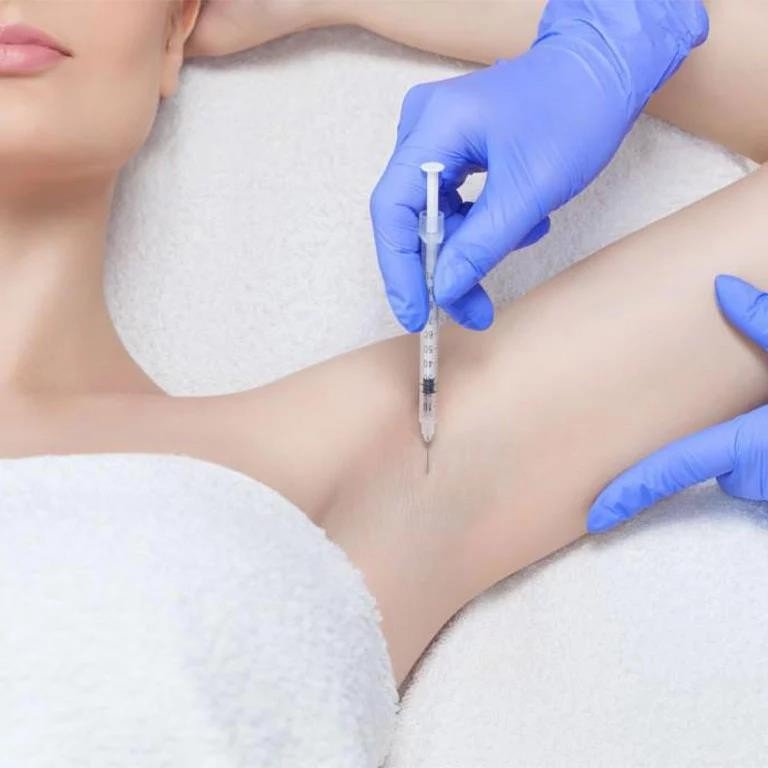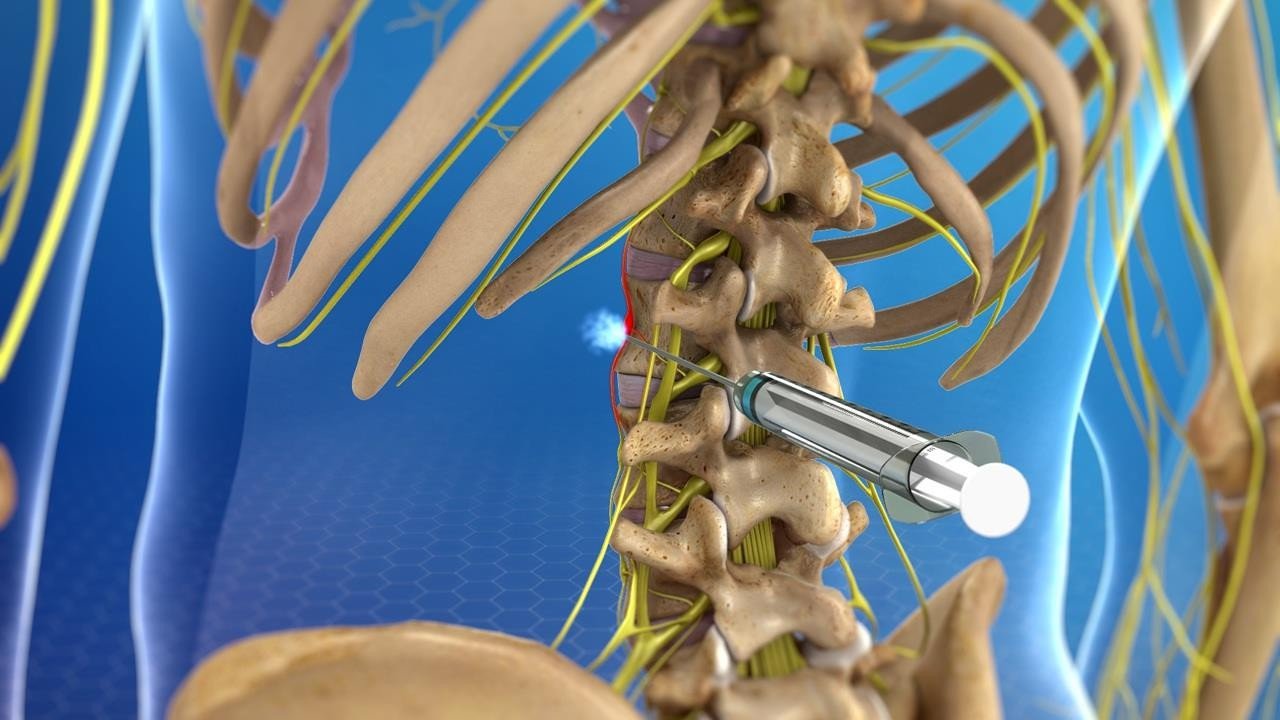Mitigate Pain Clinic – Dr Jeshnu Tople – Pain Management Specialist In Nagpur
Hyperhidrosis
Hyperhidrosis
Types of Hyperhidrosis
Hyperhidrosis can be classified into two main types:
- Primary Focal Hyperhidrosis: This form affects specific areas of the body, such as the palms, soles, underarms or face. It often begins in childhood or adolescence and is thought to have a genetic
- Secondary Generalized Hyperhidrosis: This type is usually
caused by an underlying medical condition, such as diabetes, hyperthyroidism, menopause or certain infections. It can affect the entire body and often begins in adulthood.
At Mitigate Pain Clinic, we specialize in understanding the root cause of each patient’s hyperhidrosis, whether it is primary or secondary, to tailor a treatment plan that fits their specific needs.
Symptoms of Hyperhidrosis
The most obvious symptom of hyperhidrosis is excessive sweating. However, the condition presents itself in specific patterns:
- Localized Sweating: In primary focal hyperhidrosis, sweating is often confined to specific areas such as the hands, feet, underarms and face.
- Widespread Sweating: In secondary hyperhidrosis, sweating may occur all over the body or in more extensive areas, typically triggered by an underlying health issue.
These symptoms can lead to other secondary problems like skin infections, rashes, or irritation due to constant dampness. Addressing these concerns promptly at Mitigate Pain Clinic can prevent complications and improve the quality of life for patients.
Impact of Hyperhidrosis on Daily Life
Living with hyperhidrosis can significantly affect a person’s physical, social, and emotional well-being. Some of the common challenges include:
- Social Embarrassment: Excessive sweating in social situations can cause anxiety, embarrassment and self-consciousness.
- Workplace Difficulties: Handling documents, typing, or shaking hands can become uncomfortable and inconvenient.
- Physical Discomfort: Constantly having wet clothes or shoes can lead to irritation, skin conditions, and body odor.
At Mitigate Pain Clinic, we recognize these difficulties and provide support to help individuals regain their confidence and comfort.

Diagnosis of Hyperhidrosis
Treatment Options for Hyperhidrosis
There are several treatment options available for hyperhidrosis, ranging from non-invasive methods to more advanced interventional approaches. Some of the commonly recommended treatments include:
- Topical Antiperspirants: Over-the-counter or prescription-strength antiperspirants may help reduce sweating.
- Oral Medications: Anticholinergic medications are sometimes prescribed to block the signals that stimulate sweat glands.
- Lifestyle Adjustments: Wearing moisture-wicking clothing, using absorbent powders, and reducing stress can help mitigate sweating
While these methods may provide temporary relief, patients with severe cases of hyperhidrosis often seek more advanced interventions offered at Mitigate Pain Clinic.

Interventional Pain Management for Hyperhidrosis
Interventional pain management is a specialized area of medicine that focuses on using minimally invasive techniques to alleviate chronic conditions. At Mitigate Pain Clinic, we integrate interventional techniques to treat severe hyperhidrosis effectively.
- Botox Injections: A common procedure that involves injecting botulinum toxin into the affected area to temporarily block the nerves responsible for activating sweat glands.
- Sympathetic Nerve Blocks: This minimally invasive procedure involves blocking the sympathetic nerves that control sweating.
Our experienced interventional pain management specialist ensures that these procedures are performed with precision to provide long-lasting relief for patients.
Botulinum Toxin (Botox) Injections for Hyperhidrosis
Botox injections have gained popularity as an effective treatment for hyperhidrosis, particularly for areas like the underarms, hands, and feet. This procedure works by blocking nerve signals. Botox blocks the chemical signals that stimulate sweat glands, significantly reducing sweat production in the targeted areas. Botox treatments are quick, typically lasting around 30 minutes, and can provide relief for up to six months. Mitigate Pain Clinic offers this procedure as part of our comprehensive approach to treating hyperhidrosis, ensuring a safe and comfortable experience for our patients.

Sympathetic block and RFA for Hyperhidrosis
For more severe cases of hyperhidrosis, more advanced interventional treatment i.e. sympathetic block and radiofrequency ablation may be required.
A sympathetic block is a minimally invasive procedure used to temporarily block the sympathetic nerves responsible for triggering excessive sweating in patients with hyperhidrosis. It involves injecting an anesthetic near the sympathetic nerve chain to interrupt the signals that cause excessive sweating. Radiofrequency ablation (RFA) of sympathetic nerves is a longer-lasting treatment that uses heat generated by radiofrequency energy to damage or destroy the specific nerves, reducing their ability to trigger sweat production.
Both treatments can offer significant relief and are available at specialized clinics like Mitigate Pain Clinic to help manage hyperhidrosis effectively.


The Role of Mitigate Pain Clinic in Hyperhidrosis Care
Patient-Centered Approach at Mitigate Pain Clinic
We understand that hyperhidrosis can have a significant impact on a person’s quality of life. At Mitigate Pain Clinic, our patient-centered approach ensures that:
- Personalized Treatment Plans: Each patient receives a treatment plan that is tailored to their specific needs and preferences.
- Compassionate Care: We prioritize patient comfort and well-being throughout the entire treatment process.
Lifestyle Modifications to Manage Hyperhidrosis
In addition to medical treatments, there are several lifestyle changes that can help manage hyperhidrosis:
- Moisture-Wicking Clothing: Wearing breathable fabrics can reduce discomfort caused by excessive sweating.
- Dietary Adjustments: Avoiding spicy foods, caffeine, and alcohol may help reduce sweating.

FAQs About Hyperhidrosis
Our Treatments
- Joint Pain
- Back Pain
- Sciatica Pain
- Neck Pain
- Hand Pain
- Shoulder Pain
- Foot & Ankle Pain
- Limb Pain
- CRPS Pain
- Cancer Pain
- Headache
- Hyperhidrosis
- Herpes Zoster Pain
- Chronic Pelvic Pain
- Scar Tenderness
- Postherpetic Neuralgia
- Trigeminal Neuralgia
- Peripheral Neuralgia
- Chronic Vascular Pain
- Generalised Body Pain
- Chronic Injury Pain
- Failed Back Surgery Syndrome
- Chronic Post Surgical Pain
- Other Painful Conditions
- Slipped DISC / PIVD